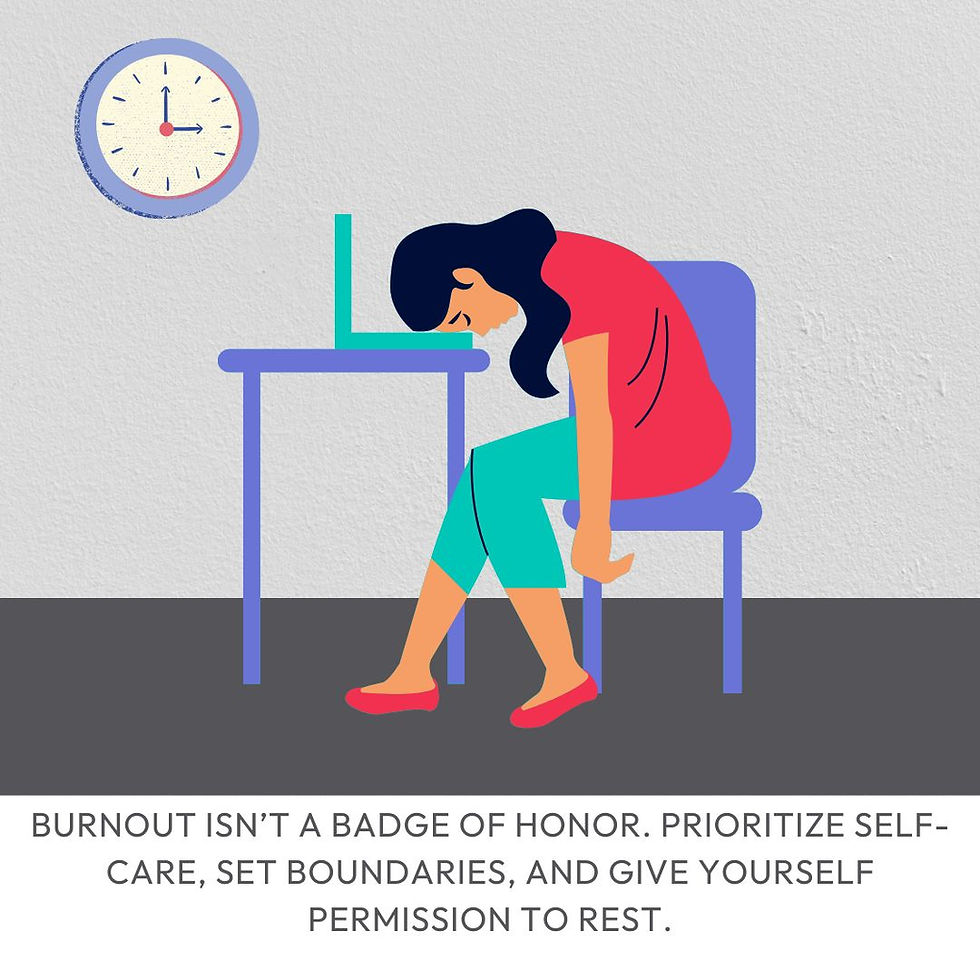Why Taking Vacation Time Is Essential for Mental Health?
- Inner Calm Collective
- Jan 20
- 3 min read
In today’s fast-paced world, taking time off from work isn’t just a luxury—it’s a necessity. Yet, many people neglect their vacation time, often feeling guilty for stepping away. However, research shows that taking regular breaks from work can significantly enhance mental health, productivity, and overall happiness. In this article, we’ll explore the profound connection between vacation time and mental well-being, and share actionable tips to help you fully embrace your time off.

Why Vacation Time is Essential for Mental Health?
Research from the American Psychological Association shows that taking regular vacations can reduce stress levels by up to 68%. This isn't just about feeling more relaxed—it's about fundamental changes in your brain chemistry. During vacation time, cortisol levels decrease while serotonin production increases, creating a natural boost to your mental well-being.
Key Benefits of Regular Time Off:
Reduced risk of depression and anxiety
Improved sleep quality and duration
Enhanced creativity and problem-solving abilities
Stronger personal relationships
Better cardiovascular health
Reduces Stress and Burnout.
Workplace stress is a leading cause of burnout, affecting both physical and mental health. A well-planned vacation allows your mind and body to reset, reducing cortisol levels and improving mood. Studies have shown that employees who take regular breaks experience lower stress levels and greater job satisfaction.
Enhances Productivity and Creativity.
Stepping away from daily responsibilities gives your brain a chance to recharge. This mental reset can boost creativity and problem-solving skills, enabling you to return to work with a fresh perspective. In fact, some of history’s greatest innovations were born during periods of relaxation and downtime.
Strengthens Personal Relationships.
Vacation time provides an opportunity to reconnect with loved ones without the distractions of work. Whether it’s a family trip or a solo retreat, these moments can deepen relationships and enhance your emotional well-being.
Regular vacation time reduces stress levels by 68% and boosts productivity by 31%, making it an essential investment in both mental health and career success.
Practical Tips for Making the Most of Your Time Off.
Plan Ahead
Set Boundaries: Inform your team about your time off well in advance and delegate tasks to avoid work-related interruptions.
Create an Itinerary: While spontaneity can be exciting, having a loose plan ensures you make the most of your vacation.
Disconnect from Work
Turn Off Notifications: Resist the urge to check emails or work messages. Consider setting up an out-of-office reply.
Practice Mindfulness: Use your vacation to engage in activities that keep you present, such as yoga, hiking, or journaling.
Prioritize Activities That Bring Joy
Try Something New: Whether it’s exploring a new destination or learning a hobby, novel experiences can be incredibly fulfilling.
Relax and Recharge: Balance your schedule with downtime. Sometimes, doing nothing is the best way to recharge.
The Post-Vacation Effect.
Perhaps most surprisingly, the benefits of vacation time extend well beyond the actual break. Studies show that workers who take regular vacations are 31% more productive and report 40% higher job satisfaction upon return.
Overcoming Vacation Guilt. 💭
Many professionals struggle with feeling guilty about taking time off. Remember: vacation time is not a privilege—it's a necessary component of maintaining mental health and professional performance. Companies with generous vacation policies report lower turnover rates and higher employee satisfaction.
Quality vacation time enhances brain chemistry, reducing cortisol and increasing serotonin, resulting in improved mental well-being and workplace performance.
Creating a Sustainable Work-Rest Pattern.
The key to maximizing vacation benefits lies in creating a sustainable pattern of work and rest throughout the year. Consider these strategies:
Take regular long weekends in addition to longer breaks
Plan vacation time quarterly to maintain consistent renewal
Combine different types of time off for optimal benefit
Your Action Plan for Better Mental Health.
Start viewing vacation time as a vital part of your mental health strategy. Here's how to begin:
Review your available vacation days
Schedule at least one significant break within the next three months
Create a digital disconnection strategy
Set clear boundaries with work during your time off
Let us Wrap Up: The Bottom Line.
Your mental health deserves more than just the occasional break—it requires consistent, intentional time off to thrive. Taking time off isn’t selfish—it’s essential. Prioritizing vacation time can improve your mental health, enhance productivity, and strengthen relationships. Whether it’s a weekend getaway or an extended trip, investing in your well-being pays dividends in every aspect of life.
Ready to make the most of your time off? Start planning your next vacation today and experience the transformative benefits for yourself.




Comments